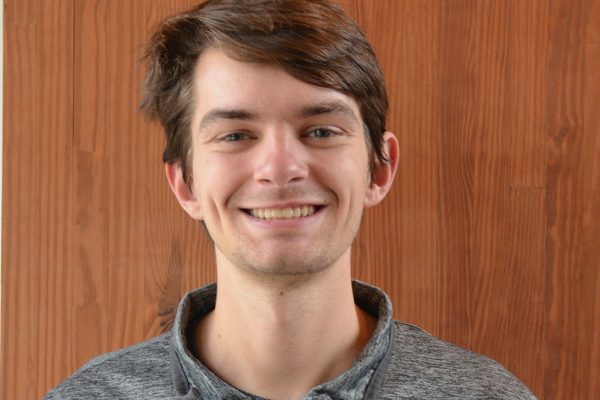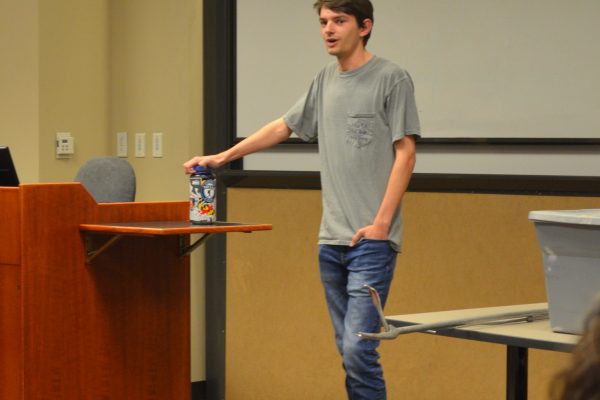Involvement within the Auburn University School of Forestry and Wildlife Sciences student organizations provides opportunity for students to exercise leadership skills, build relationships with their classmates, and foster community between students and professionals in the varying occupations associated with forestry, wildlife and natural resources. In his own words, learn how participation in student clubs has positively impacted Alex Merchlinsky’s experience at Auburn and his career potential after graduation:
Major: Wildlife
Expected Graduation: Spring 2020
Involvement: President of the Wildlife Society
What led you to choosing this major?
I knew from a young age that I really wanted to work outside and in high school it occurred to me that I could make a career out of an interest in wildlife. When researching universities, Auburn’s wildlife degree program really appealed to me.
Why did you choose Auburn?
My sister had attended Auburn and when I visited I really liked the atmosphere. Of course, the wildlife program is known to be really good as well and if you’re looking into this field, it’s definitely hard to overlook.
What is your favorite part about being a student in the school?
I really appreciate that the school allows you to focus on your interests and hone your skills within a likeminded student body. The university is obviously pretty large, but here your classmates have a common interest in preserving and conserving the outdoors, whether that be within hunting, wildlife, or natural resources.
Describe a class that you have taken as a student of your major that has left an impact on you.
Ornithology taught by Dr. Hill is probably the class that has stuck with me the most; he loves birds and really got me into them as well. He has a passion for getting his students involved with field trips and birding. Another class I would say has been impactful is Dendrology, and I liked it for the same reasons. Dr. Loewenstein has a really contagious passion for plants and taught the class really well. By the end of the course, I was also really interested in plant life even as a wildlife major whose main focus is on animals.
What opportunities within the school have helped insure your academic success?
Getting involved in The Wildlife Society my freshman year, and sticking with it, introduced me to so many other opportunities. I was able to run for officer positions, which is how I came to be where I am now as the president. One thing that I think students could take more advantage of is undergraduate research. As soon as I started considering research as a career in my sophomore year, I asked my advisor, Professor Gitzen, about what he was working on and how I could get involved. Since then, I’ve been able to work with him and it’s been a great learning experience. Last year I was awarded the undergraduate research fellowship, and I’ve been able to affirm my interest in research and build my resume through that opportunity. I’ve applied for a renewal of that position and have continued research outside of that as well.
If you are involved in a student organization within the school, describe the group’s purpose and why being a member is important to you.
I am the current president of The Wildlife Society. Our purpose is to try to strike a balance between practicing career development or professional skills and hosting social events where wildlife students can connect as a community. Recently we attended a trapping seminar taught by the Alabama Department of Conservation and Natural Resources, or ADCNR, at the Wehle Center. That was really engaging because we were learning a new skill, and I hope to continue our involvement in similar events. As far as why it’s important to be a member of the organization, I think the society also makes an effort to let people know what’s going on around the school. As an out of state student, the main thing for me has been the community aspect. I’m from Maryland, so when I got here, I didn’t know anyone, but Dr. Kenney talked about The Wildlife Society at my freshman orientation. I went to the first meeting and have been involved with it ever since.
What are you doing right now as a student that is giving you supplement to experience in your desired field?
I would definitely say research has been the main supplement; I’ve been doing a lot with statistics. I’ve finished taking samples for now for the current project, but we’ll probably start back up again when we have more people helping out, but for now, I am just analyzing the data. We do have a statistics class in the school, and there’s also population science and analysis. Those are both really great, but getting into the data when working on my own project has definitely expanded my knowledge. Those research projects have given me more experience for going into a job or for graduate school.
Where do you plan to take the knowledge that you have gained you once you graduate?
I hope to attend graduate school but am not sold on going into it right after graduating with my bachelor’s degree. I’ve been very selective with the programs that I apply to as I know my interests and don’t want to settle doing two years of research on a topic of which I am not passionate. I would also like to get a doctorate at some point, so we’ll see how that all plays out.
What are you passionate about and how has the school allowed you to pursue those passions?
I really care about conservation and the environment. The classes I’ve taken and research programs I’ve been involved with have definitely succeeded in giving me the skills that I need to launch myself into a career where I can make a real difference.
What advice would you give to upcoming freshman?
Get involved in organizations and take time to pursue your interests. Talk to your professors and ask what classes they would recommend taking. There are so many topics outside of your major that will add a lot to your education; for me that’s been classes like geospatial informatics systems and genetics.
(Written by Avanelle Elmore)











